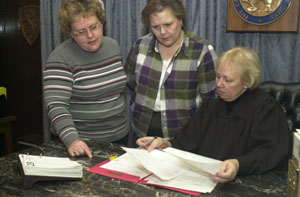By Margie Wuebker
mwuebker@dailystandard.com Mercer County Juvenile Court Judge Mary Pat Zitter calls the new Delinquency Diversion Program the most exciting thing happening in her court this year.

Started in January with a $40,000 Bryne grant from the Office of Criminal Justice Services, the program targets first-time offenders under the age of 18 facing charges for non-violent crimes. Those who comply and successfully complete the structured program will have their cases terminated without the filing of formal charges.
"We do not leave them off the hook," says diversion officer Colleen Bigham. "The young people selected for the program receive sanctions with the ultimate goal being they never end up in the courtroom."
No sexual abuse or felony cases are accepted into the program. Common violations Bigham sees involve curfew problems, alcohol and tobacco offenses, theft, disorderly conduct, criminal mischief and criminal damaging.
Bigham and chief probation officer Angie Gehle envisioned 50 participants when the grant proposal was submitted. The number has more than doubled. "We have had 107 cases involving youths ages 7 to 17 referred to the Diversion program since February," Bigham says. "Forty-six young people have successfully completed the program while 44 are still involved in the program."
The remaining participants have been disqualified for various reasons, such as an alcohol citation, domestic violence, taking a motor vehicle without permission and a parent requesting the original complaint be reinstated.
After a juvenile case has been referred to the Diversion program, Bigham forwards copies of the complaint and information about the program to the youth and parents. A date is set for a meeting with Bigham.
"I explain that successful completion of the program means the case that is pending before the court will be dismissed and no actual record will show that they have been in the juvenile justice system," she says. "The actual time involved varies from case to case with four to five months being about average. Diversion is not the easy way out. We work one on one with strict guidelines."
Some participants may be referred for counseling while everyone is required to do some community service ranging from cleaning classrooms at the Mercer County Alternative School to helping with special events like the Governor's Cup Regatta. Another requirement involves attendance at monthly First Time Offender's Group meetings where they learn the consequences of poor choices.
Special programs are offered for tobacco and alcohol offenders. Project Reality at Lima Memorial Hospital affords a sobering look at what happens when people drink and drive complete with a visit to the emergency room, intensive care unit and the morgue.
Upon successful completion, a letter is sent to the prosecutor requesting the matter be dismissed. Both the prosecutor and judge sign a subsequent journal entry with copies forwarded to the families indicating there is no longer a complaint pending.
"Things you do as a juvenile don't go away like they used to," Bigham says. "Diversion offers a chance to give first offenders a second chance to make responsible decisions."
She smiles broadly at the mention of success stories. A youth who removed stem covers from vehicles parked at a local dealership was ordered to make restitution for damages incurred by working a designated number of hours at the business. The arrangement worked so well the owner eventually hired the young man as a part-time employee.
Another $40,000 grant will provide funding in 2005. Bigham hopes to add mentoring in the coming months as a means of giving participants a positive role model. Anyone wishing to become a mentor is asked to call Bigham at 419-586-1249. |

